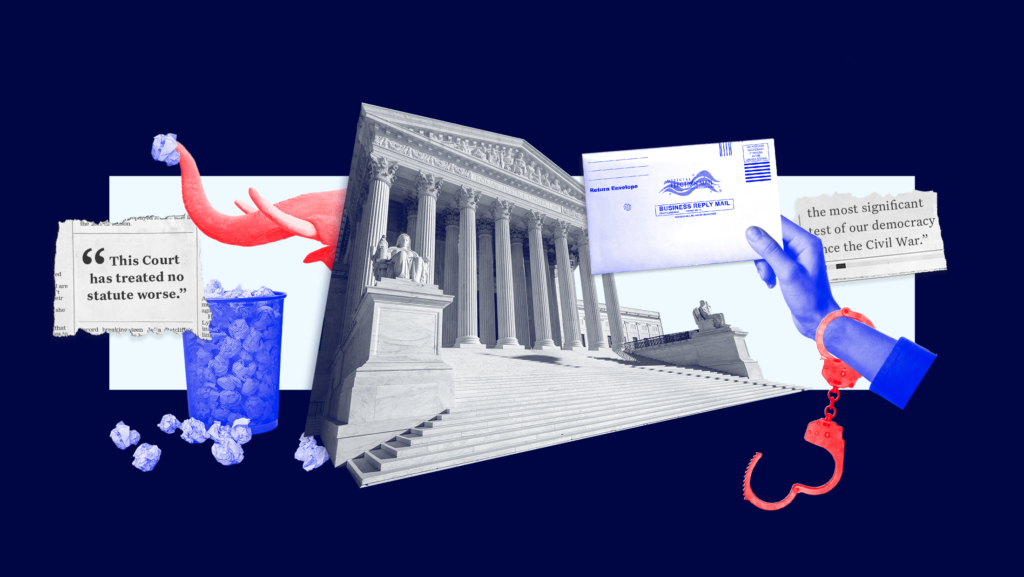Confronting the Most Significant Test to Our Democracy

“We’re going to face another test in 2022: a new wave of unprecedented voter suppression, and raw and sustained election subversion.” Those were the words of President Joe Biden on Tuesday in a major address on voting rights and democracy. He added, “We have to prepare now.”
The president is correct. We are experiencing an unprecedented attack on voting, election administration and democracy — and we must all prepare now. It is, as the president warned, “the most significant test of our democracy since the Civil War.”
The challenge to save our democracy is not a simple one. There is no one solution. There is no easy answer. It will require the skill and courage of millions of Americans to stand up against authoritarianism and for democracy. While there remains a central role for legislation, political organizing and public pressure, we cannot ignore the central role that our courts play in preserving and protecting our fundamental rights, including the right to vote.
Biden singled out the importance of litigation, not just by the U.S. Department of Justice, but by private groups to protect voting rights. He recognized the need for private groups “to stay vigilant and challenge these odious laws in the courts.”
Yet, since the U.S. Supreme Court’s ruling in Brnovich v. Democratic National Committee much of the commentary and punditry has suggested the opposite — that current and future voting rights litigation is futile, or perhaps even counterproductive. Far too much of this rushed analysis contains sweeping statements that lack the nuance needed when discussing complex constitutional jurisprudence and voting rights laws.
While the Supreme Court’s decision was a deep disappointment and wrongly decided, it neither signals the end of voting rights litigation nor the important role the courts play in protecting voting rights and fair election administration. We can agree with Justice Elena Kagan’s important dissent without giving up hope that there will be other cases and victories in the future.
There is no doubt that we have a conservative Supreme Court that has shown hostility to voting rights protections. This has caused some to argue that we should hold back on bringing new cases that could give the Court the opportunity to further erode voting rights jurisprudence. While they rightly point out that a hostile Supreme Court can further damage the remaining laws and constitutional guarantees protecting voting rights, they fail to grapple with the alternative.
If we simply allow the right to vote to be eroded by state laws and partisan actors committed to undermining free and fair elections, there will be nothing left for the remaining laws to protect. If you believe that democracy is in crisis now, then allowing voter suppression measures to take hold will imperil the ability to wage these court fights later.
We will not likely have a progressive Supreme Court for a generation, and without judicial action now, Republican state legislatures will enact suppressive voting laws, gerrymandered maps and anti-democratic election administration provisions that will lead to irrevocable damage to our democracy.
Put simply, if you agree with Biden that “we are facing the most significant test of our democracy since the Civil War,” then the decision about whether to aggressively litigate is clear.
That does not mean that we do not consider the potential negative outcomes in litigation. I think about these issues every day, and I’m haunted by cases we lose and feel relief in cases we win. Just as there are no simple answers, there is little joy in this work.
My bias towards action is based on a genuine belief that Biden is correct. Our democracy cannot sustain further erosion of democratic norms, institutions and electoral protections while we await a more favorable judiciary. The next elections could mark a turning point that undermines how we conduct and certify elections so deeply that we will not recover.
That is why we must continue the legal fights in court. I am mindful of the risk we run, but I’m equally mindful of the consequences if we avoid tough cases and leave voters to fend for themselves.
Brnovich was a bruising defeat for voters and voting rights. But, we cannot lose sight of the fact that we still have tools available to challenge voter suppression laws.
More than 50 years ago, the Supreme Court said that “[t]he right to vote freely for the candidate of one’s choice is of the essence of a democratic society, and any restrictions on that right strike at the heart of representative government.” We must all recommit ourselves to fighting every day to protect our fragile democracy.